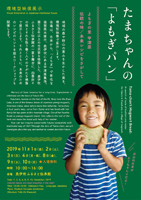Visual Installation in Japanese traditional house
Tama-chan’s Mugwort Bread:
In search of taste of tradition and recipe for future in Kozuhara, a village of mugwort

Memory of food remains for a long time. Ingredients in childhood are the base of future life.
Kozuhara, locates on the foot of the Mt. Ibuki near the Biwa Lake, is one of the famous places of Japanese yomogi-mugwort, Artemisia indica, since before more than millennia. Tama-chan, a four years lady came from Kyoto and has lived with her family for two years. One of her favorite food is yomogi-mugwort bread. She collects the leaf of the herb and made the bread with help of her mother.
How can we imagine sustainable future compatible with traditional way of life? Through the lens of Tama-chan, we will investigate plausible way and method to commit desirable future.
*** *** ***
Our daily life is connected with future. Physically, everyday ingredients consist of our body. And act of eating plays an important role in our mental life. In both dimension, food endures in us for a long time. Food sustains our longevity physically and mentally.
In our research we found that memory of food even remains in our memory for more than hundred years. Today’s food might be your dish for hundred years.
Will Tama-chan remember her mugwort bread in her future? We don’t know. But it must be certain that it will be a precious part of her food memory, even if it would be forgotten by her and remained only in her under-consciousness.
This installation is a kind of thought experiment for future imagination of food praxis.
| Date: | 1, 2, 3, 4, 8, 9, 10, November, 2019 |
| Time: | 10:00 - 16:00 |
| Place: | Okuibuki furusato denshokan (Okuibuki Folk-life Museum) ( →Access) |
| Language: | Japanese |
| Admission Free | |
| Workshops: |
|
|---|---|
| Supported by the research project “Praxis and theory of open commitment for documenting and archiving” led by Research Institute for Humanity and Nature, “Interactive Communication Initiative” led by National Institute for Humanities, and Kozuhara Archiving Club. | |
| Contact: | Masahiro Terada (Research Institute for Humanity and Nature)  Kozuhara Archiving Club  |

